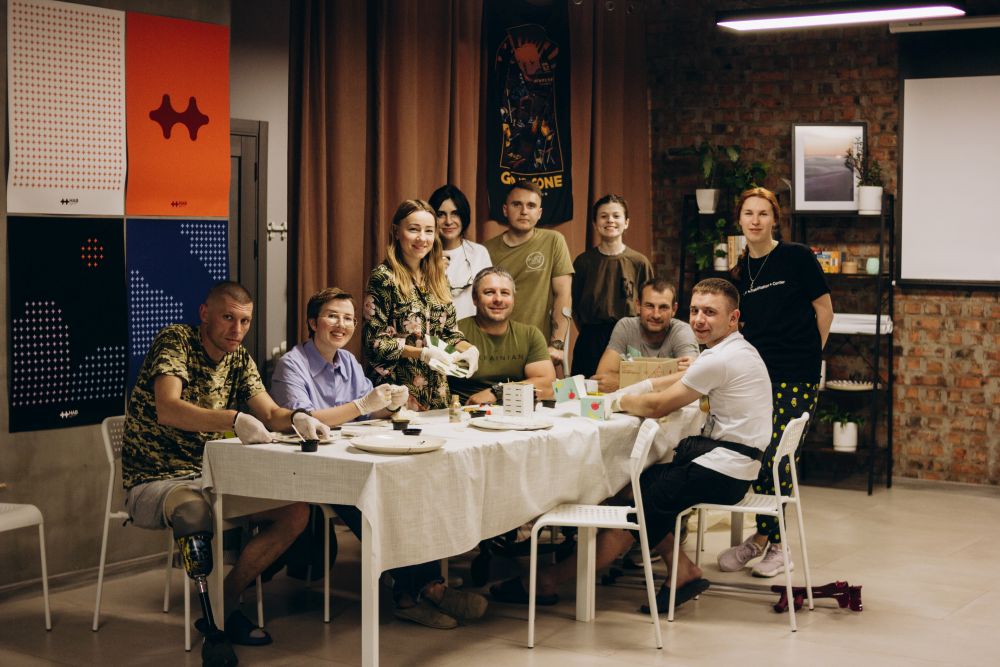“HAB | Lviv Habilitation Center” is the first habilitation center in Ukraine that enables combat veterans and people affected by the war to acquire new and much-needed skills before returning to normal life in society, taking into account their individual physical changes. We are talking about adapting to a “new life” for people with amputations, in wheelchairs, recovering from mental pressure, etc.
The Habilitation Center is a pilot project of the Alliance for Public Health in collaboration with UNBROKEN and supported by Gilead Sciences and Frontline AIDS. Serhiy Titarenko, head of the habilitation process at Lviv Habilitation Center (HAB), a veteran of the Russian-Ukrainian war, told us what is so unique about the facility.
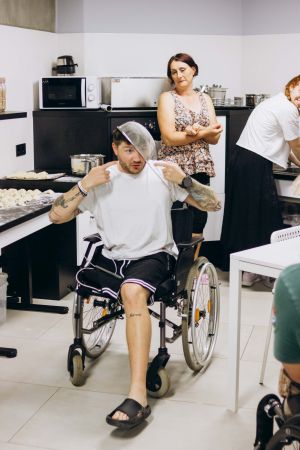 Habilitation is my Superpower
Habilitation is my Superpower
Serhiy is a retired major in the Ukrainian Army Aviation after being seriously injured and now he has to use a wheelchair to get around. During his rehabilitation, he mastered another profession – a psychologist – and now helps people with disabilities of various nosologies, wounded soldiers, veterans and their families.
“Since I myself went through the path of treatment, rehabilitation, and adaptation, I realized that it is already the eleventh year of the war, and we still do not have a route for veterans to return to society,” said Serhiy Titarenko. – ” It was really an abyss, because you were discharged from the hospital to nowhere: in our country practically nothing is equipped for wheelchair mobility, and people are not trained and have not tried to do anything on their own in this new condition.
Anna Gorkun, the head of this program, involved me in a project that was about to open in Lviv, and together we developed a concept of habilitation to close the existing gap between medical and rehabilitation facilities and the return of veterans to community life.
The term “habilitation ” comes from the adolescent psychology and means the transition from childhood to adulthood through the acquisition of useful skills that will be used for normal adaptation, realization and self-realization. If we draw a parallel between adolescent habilitation and the reintegration and socialization of a war veteran, the same thing essentially happens: a person finds himself or herself in a new state for which he or she is not prepared, finds himself or herself face to face with his or her disability, and must acquire useful skills to integrate into society in a new status. That’s how the idea to create a habilitation center came about.
A client story
We had a patient who was ashamed to be photographed because of a mine-blast injury to his face. He was also ashamed to go out “in public” because his face was severely damaged. After 3 weeks at the HAB we managed to get him to the point where he could use public transportation on his own. This is an extremely big achievement in such a short time!
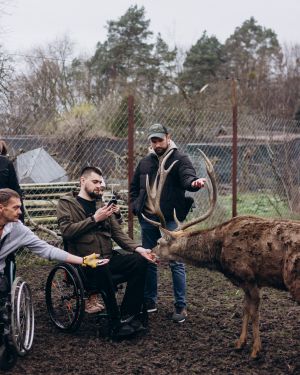 There are No Such Facilities in Ukraine
There are No Such Facilities in Ukraine
Anna Gorkun, project manager of the Lviv Habilitation Center, said that HAB | Lviv Habilitation Center is a unique institution in Ukraine that has gained very wide popularity in 4 months and needs to be expanded to other regions.
Anna has been actively involved in the development of shelters for over 2 years and has received many requests for rehabilitation from war veterans.
“People who have completed the rehabilitation course and stabilized their psycho-emotional and physical condition can move on and return to society, but it is at this stage that they really need help,” says Anna Gorkun. – “With the help of physical therapists and psychologists, our residents learn to cook on their own, go shopping and use public transport – that is, they learn to do what they will need to do in their normal lives”.
The Habilitation Center is located in Lviv at 86B Stryiska St. At the same time, 23 residents can live here in 9 rooms, 6 of which are fully adapted for wheelchair users. Also, if a person lives in Lviv or is in a medical rehabilitation facility, he or she can undergo inpatient habilitation without living in the HAB.
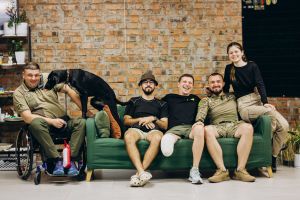
“Our work goes beyond the rehabilitation of veterans and people affected by the war. We are actively working to prepare society for changes in the perception of people with disabilities and war veterans. It is important for us that everyone understands the importance of a proper communication and support for these people. We are actively developing our information outreach work, conducting lectures both online and offline, reaching more than 10,000 people across Ukraine. Among the listeners were UCU professors, residents of our building where the HAB is located, and representatives of Diya, etc.
We also provide support to the families of veterans and people with disabilities, organizing various events to help them distract from the heavy memories about the war. For example, we recently held a floral master class together with the “Blyzki” (“Close Ones”) foundation, where they could enjoy the beauty and get a little distraction.”
Since the HAB is not a medical facility, people can get here by self-referral or with a doctor’s recommendation.
The resident route consists of the following steps:
● An introductory meeting, during which the resident learns about the services available, additional programs and house rules.
● Selection of an individual program in accordance with the person’s request (for example, learning to ride public transport independently). This is done through a psychological test, which takes into account the specific goals that the person wants to achieve during the 3 weeks of stay at the center.
● Based on the information gathered, rehabilitation therapists develop a program of supportive rehabilitation classes, and psychologists, on their part, develop a program for re-entry into society.
We had a woman from Avdiivka who was injured during the shelling. Her request was that she did not understand how to hold a cooking pot staying on one leg. That is, the requests of residents are things that we do not think about in everyday life, but for people with disabilities who have just acquired them, it is a challenge. And this challenge needs to be overcome.
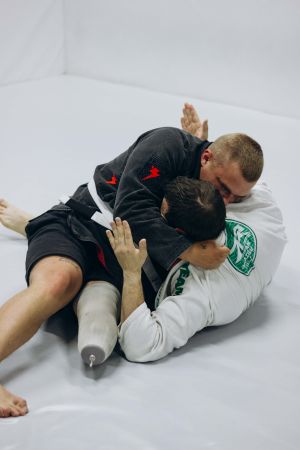 The residents can get the following services at the center:
The residents can get the following services at the center:
● Accommodation for people with disabilities of various nosologies
● Assistance in cooking in an inclusive kitchen
● Supportive physical rehabilitation
● Manual therapy
● Psychological individual and group interventions
● Pet therapy
● Art therapy, breathing practices
● Body-oriented practices
● Physiological and sports activities
● Yoga-nidra
● Joint activities with a large number of organizations that are adapted for people with disabilities (jiu-jitsu, yoga, swimming)
“During the three weeks of staying at the HAB, people become very friendly with each other, start discussing very personal things that they would not say in public. We are all buddies here! After completing their habilitation and leaving the center, many residents continue participating in our activities, always calling and asking what events they can join. For example, recently it was a mountain hiking,” says Serhiy Titarenko.
According to the Ministry of Veterans Affairs, the projected number of veterans, their families and families of fallen soldiers after Ukraine’s victory in the war with Russia will be about 3 million people (10% of the total population of Ukraine). The first war veterans are already returning home, so the opening of habilitation centers in Ukraine is an extremely important initiative!

